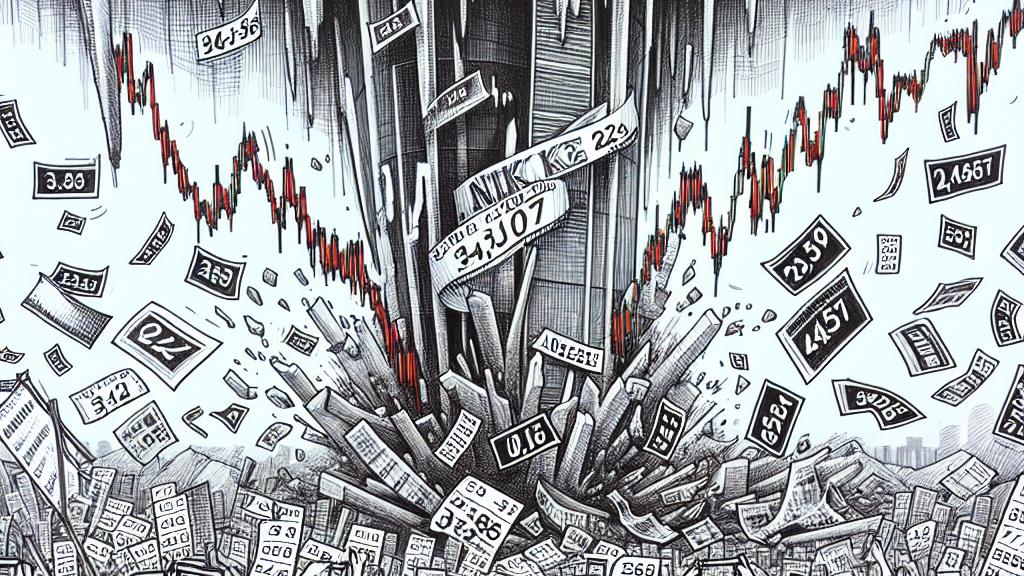Stock Market Shock: Nikkei Plummets 4451 Points, Breaking Black Monday Records!
Overview
- The Nikkei index experienced a catastrophic drop of 4451 points, representing a 12% decline.
- This significant fall surpasses the historic decline seen during Black Monday in 1987.
- Panic selling ensued globally, with fears of an impending economic recession driving the market down.

The Event Unfolds in Japan
On August 5, 2024, Japan found itself at the epicenter of a financial earthquake as the Nikkei 225 index collapsed by an astonishing 4451 points, closing at 31,458. This represents a 12% decline, marking the largest single-day drop since the infamous Black Monday in October 1987. The catalyst for this massive downturn was rooted in escalating fears regarding a potential economic slowdown in the United States, which triggered widespread panic among investors. Institutional investors, hedge funds, and retail participants alike rushed to liquidate their holdings, further amplifying the market's downward spiral.
Market Response and Emergency Measures
In reaction to the unprecedented market turmoil, the Osaka Exchange activated its circuit breaker system on two occasions throughout the trading day. This measure temporarily halted trading in an effort to calm the markets and prevent further plummet. Circuit breakers are designed to provide investors with a moment to reassess their positions amidst extreme volatility. By the end of the day, more than 800 stocks had hit their daily trading limits, reflecting a pervasive sense of trepidation among investors. Key players in the market, such as Mitsui Sumitomo Financial Group and Tokyo Electron, faced severe losses, underscoring a broader sentiment of distrust in Japan's economic stability. Amid this turmoil, analysts noted how fears of a recession were triggering panic selling, reinforcing a cycle of fear among traders.
Global Impact and Currency Resilience
The shockwaves from Japan's market crash reverberated across global markets, with significant declines recorded in other major Asian indices, including South Korea's KOSPI and Taiwan's Taiex. As investors scurried for safer assets, the Japanese yen appreciated against the dollar, climbing to roughly 141 yen per dollar. This scenario illustrates the intricacies of global financial markets, highlighting how a severe downturn in one region can induce widespread panic and volatility in others. The interconnectedness of these markets means that a single event can provoke a cascade of reactions, reinforcing the importance of maintaining a keen awareness of global economic indicators.
Historical Context and Lessons Learned
Reflecting on the current crisis, it's essential to draw parallels to past market events, notably the catastrophic Black Monday in 1987. On October 19, 1987, the Nikkei index plummeted by 3836 points, a stark reminder of the volatility that can accompany financial markets. However, in the years that followed, Japan experienced a rapid recovery, fueled by economic reforms and renewed investor confidence. Today's conditions, marked by a complex array of global economic challenges, demand a fresh perspective on investing strategies. The current market conditions highlight the necessity for diversification and risk management while emphasizing the importance of leveraging historical lessons to navigate through turbulent times.
Investor Strategies during Market Turmoil
In the face of such uncertainty, investors are redoubling their efforts to adapt their strategies and fortify their portfolios. One common approach is diversification, spreading investments across asset classes to reduce risk exposure. Moreover, real-time data analysis and responsive trading strategies are becoming critical as investors seek to stay ahead of market movements. As the current crisis unfolds, it serves as a formidable learning opportunity on the importance of being adaptable and educated in investment practices. Understanding historical context alongside implementing modern risk management techniques will empower investors to strategically maneuver through future market disruptions, safeguarding their investments against potential losses.

Loading...